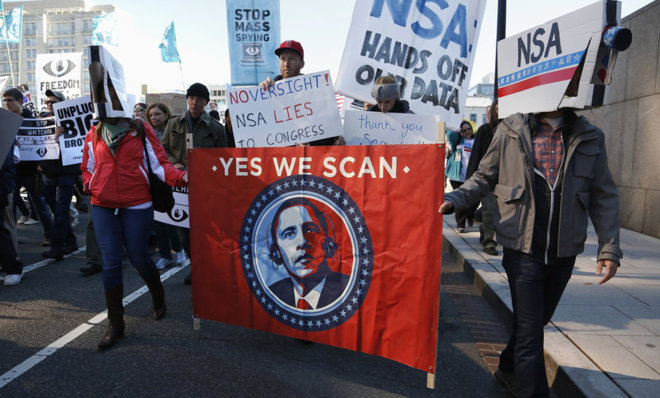Did Obama know about the NSA's eavesdropping on foreign leaders?
A German newspaper reports that the U.S. president was aware of snooping on Angela Merkel's cellphone. The NSA says "nein."


A free daily email with the biggest news stories of the day – and the best features from TheWeek.com
You are now subscribed
Your newsletter sign-up was successful
Last week, Marc Ambinder explained why the U.S. National Security Agency eavesdrops on foreign governments, even some allies, saying the president "needs to have solid intelligence, a good guesstimate, on what other countries are going to do and how they will respond to whatever he decides to do...It's not controversial."
But Ambinder had "one genuine question: If information from these NSA operations ever made it into the President's Daily Brief, did the NSA identify the source?"
Germany's Bild am Sonntag purports to answer that. On Sunday, citing unidentified U.S. intelligence sources, the German newspaper reported that NSA chief Gen. Keith Alexander told President Obama about German Chancellor Angela Merkel's cellphone being tapped in 2010, and Obama allowed the eavesdropping to continue. This reportedly included the content of her text messages and cellphone calls.
The Week
Escape your echo chamber. Get the facts behind the news, plus analysis from multiple perspectives.

Sign up for The Week's Free Newsletters
From our morning news briefing to a weekly Good News Newsletter, get the best of The Week delivered directly to your inbox.
From our morning news briefing to a weekly Good News Newsletter, get the best of The Week delivered directly to your inbox.
There's more: A day earlier, Germany's Der Spiegel reported that the U.S. has been eavesdropping on Merkel since 2002, three years before she was elected chancellor. That report was apparently based on documents leaked by former NSA contractor Edward Snowden. The Wall Street Journal late Sunday added that Obama stopped the bugging of Merkel and other world leaders after a White House review uncovered the program over the summer.
The NSA and White House both say the Bild report is wrong. "General Alexander did not discuss with President Obama in 2010 an alleged foreign intelligence operation involving German Chancellor Merkel, nor has he ever discussed alleged operations involving Chancellor Merkel," said NSA spokeswoman Vanee' Vines. "News reports claiming otherwise are not true."
Assuming the reports of NSA eavesdropping on Merkel are true — and they seem to be, at least for some period of time — should Obama have known about it?
Ambinder seems to suggest that no, Obama and all other U.S. presidents need to know the information about what foreign governments are thinking, but not the specific sources. That's more or less the line the White House is taking, too. "American officials have said that while the president approves major operations for the intelligence agencies, he does not get involved in the selection of targets," says The New York Times, quoting an administration official: "I think this just wasn't on the White House radar."
A free daily email with the biggest news stories of the day – and the best features from TheWeek.com
The idea that Obama didn't know about eavesdropping on a close ally like Merkel until a few months ago, when he promptly put a stop to it, might help smooth things over with an angry Germany. But it doesn't sit well with his U.S. critics.
"Either the administration officials who leaked this information to the WSJ are lying or Barack Obama should be impeached... for cluelessness," says Roger L. Simon at Pajamas Media. "This president and his administration have taken hands-off leadership and leading from behind to unprecedented levels."
The Wall Street Journal editorial page also scolds Obama, but for "sounding defensive as usual" and not protecting the NSA programs. "OMG, the Americans might be eavesdropping?" the editorial asks Europe in mock horror. All nations spy on one another. If you read between the lines, Merkel "and her colleagues don't need a lesson in the birds and the bees of statecraft, but they must appease the cries of domestic anti-American outrage."
The French outrage is especially hard to take seriously given that Le Monde reported this summer that the French intelligence agency DGSE maintains its own robust data-collection program on domestic and foreign targets.... The German case is more sensitive even if the details remain unclear. Nobody doubts Mrs. Merkel's personal bona fides as a friend of the U.S. But there are good reasons the U.S. would want to eavesdrop on German chancellors, going back decades. [The Wall Street Journal]
"It is tempting to dismiss the latest revelations with an everyone-does-it shrug," says David Sanger in The New York Times. But even Obama has publicly hinted that the NSA's growing capabilities "have expanded faster than its judgment," and that U.S. surveillance might need to be reined in. And these leaks seem to be threatening to do real damage to U.S. alliances.
"Obama, like his predecessors, argues that the United States taps phones and hacks into computers only to protect the world, not to gain commercial advantage," Sanger says, but the leaders of allied governments are a gray area. And one thing at least seems clear in today's world: "The NSA's Cold War–era argument, that everyone does it, seems unlikely to win the day."
Peter has worked as a news and culture writer and editor at The Week since the site's launch in 2008. He covers politics, world affairs, religion and cultural currents. His journalism career began as a copy editor at a financial newswire and has included editorial positions at The New York Times Magazine, Facts on File, and Oregon State University.
